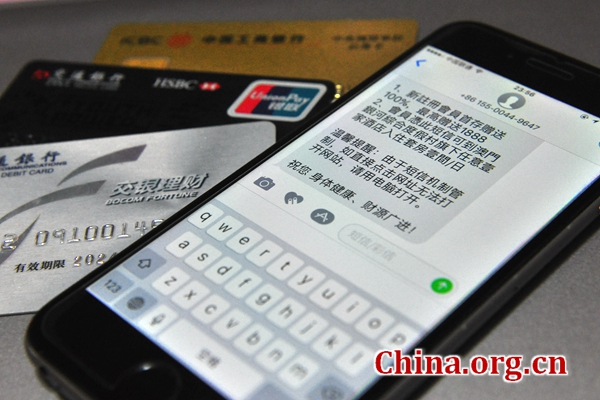Law enforcement tightens over telecom fraud
- By Guo Yiming
 0 Comment(s)
0 Comment(s) Print
Print E-mail China.org.cn, March 13, 2017
E-mail China.org.cn, March 13, 2017
|
|
|
A typical message of a telecom fraud scam seen on a smartphone [Photo by Guo Yiming/China.org.cn] |
Chinese authorities have increased their efforts to crack down on telecom fraud after the crime became rampant last year following a series of high-profile cases which made headlines across the country.
The Supreme People's Procuratorate (SPP) has prosecuted a total of 19,345 suspects and supervised the handling of 62 major fraud cases, said the procurator-general Cao Jianming during his work report at the height of the ongoing sessions of the top legislators on March 12.
People's courts of all levels have tried and concluded a total of 1,726 cases related to telecom-based fraud, where suspects have cheated people out of their money through telecommunication channels.
A string of death-trigger fraud cases or cases involving huge amounts of money have thrust the issue into the spotlight causing concern over public security.
Xu Yuyu, an 18-year-old high school graduate, died of cardiac arrest after her college tuition fees were swindled in a telephone scam last August.
In the same month, another teenage girl in south China's Guangdong Province committed suicide after being similarly defrauded of her tuition fees.
In another case, a faculty member of Tsinghua University in Beijing also fell prey to a financial scam as he was swindled out of 17.6 million (US$ 2.6 million) by telecom fraudsters.
"Most of the fraud cases were essentially caused by the leakage of personal information," said Pony Ma, CEO of Tencent Holdings and a deputy to the National People's Congress (NPC). He called for more concerted efforts industry-wide to ensure data security and develop more technology solutions to safeguard people's private information.
Liang Zhiyi, a local police chief in China's southern city of Foshan and also a NPC deputy, suggests that all the cellphones should be pre-installed with security software to keep potential fraudsters at bay.
In response to wide public concern, Miao Wei, head of the Ministry of Industry and Information Technology, revealed that Chinese authorities have established a synergy mechanism to crack down on the rampant crime.
We have launched an overall real-name registration system for all telecom subscribers and constantly filter potential spam messages, said Miao.
They have also suspended the use of 700,000 phone numbers which are suspected to be in the hands of fraudsters.
In 2016, as much as 5.12 billion yuan (US$ 741.5 million) was restored through the quick emergency payment suspension system, and about 670,000 bank card accounts have been cleared out due to suspicion of fraud, according to statistics provided by the Ministry of Public Security.
Last year, the police dispatched work teams to several countries, including Kenya, Laos, Malaysia, Cambodia and Spain, retrieved 561 telecom fraud suspects, and busted nearly 7,700 telecom fraud rings nationwide.






